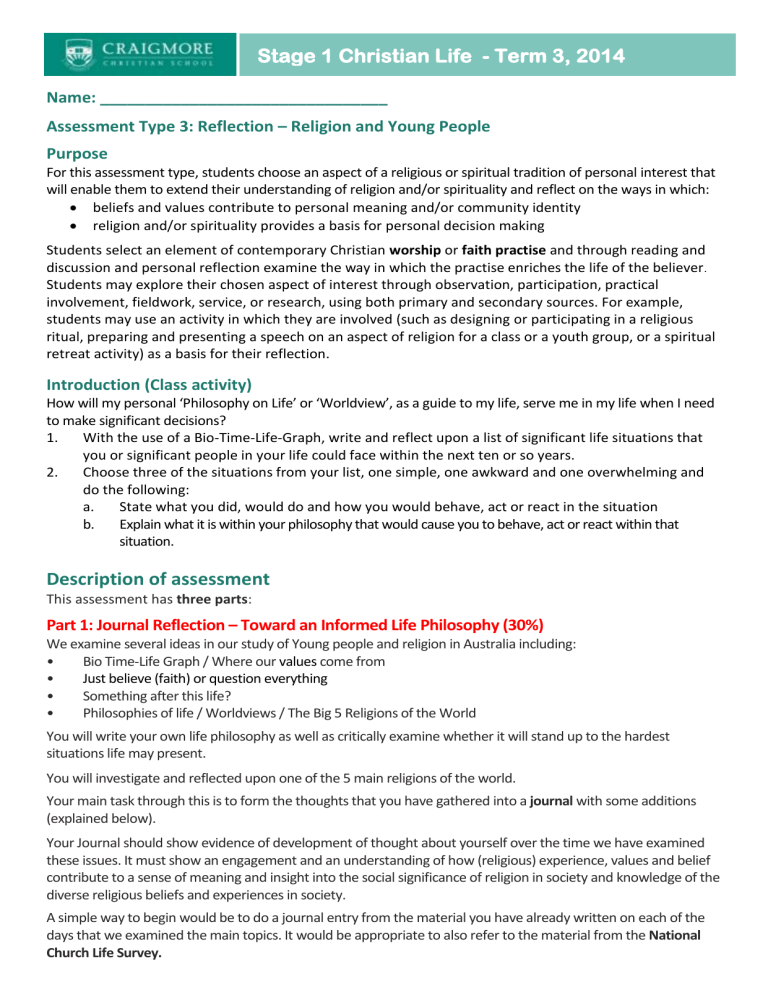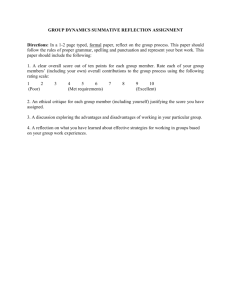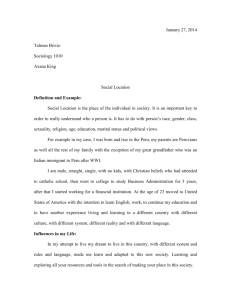File

Stage 1 Christian Life - Term 3, 2014
Name: ________________________________
Assessment Type 3: Reflection – Religion and Young People
Purpose
For this assessment type, students choose an aspect of a religious or spiritual tradition of personal interest that will enable them to extend their understanding of religion and/or spirituality and reflect on the ways in which:
beliefs and values contribute to personal meaning and/or community identity
religion and/or spirituality provides a basis for personal decision making
Students select an element of contemporary Christian worship or faith practise and through reading and discussion and personal reflection examine the way in which the practise enriches the life of the believer
.
Students may explore their chosen aspect of interest through observation, participation, practical involvement, fieldwork, service, or research, using both primary and secondary sources. For example, students may use an activity in which they are involved (such as designing or participating in a religious ritual, preparing and presenting a speech on an aspect of religion for a class or a youth group, or a spiritual retreat activity) as a basis for their reflection.
Introduction (Class activity)
How will my personal ‘Philosophy on Life’ or ‘Worldview’, as a guide to my life, serve me in my life when I need to make significant decisions?
1.
With the use of a Bio-Time-Life-Graph, write and reflect upon a list of significant life situations that you or significant people in your life could face within the next ten or so years.
2.
Choose three of the situations from your list, one simple, one awkward and one overwhelming and do the following: a.
State what you did, would do and how you would behave, act or react in the situation b.
Explain what it is within your philosophy that would cause you to behave, act or react within that situation.
Description of assessment
This assessment has three parts:
Part 1: Journal Reflection – Toward an Informed Life Philosophy (30%)
We examine several ideas in our study of Young people and religion in Australia including:
• Bio Time-Life Graph / Where our values come from
• Just believe (faith) or question everything
• Something after this life?
• Philosophies of life / Worldviews / The Big 5 Religions of the World
You will write your own life philosophy as well as critically examine whether it will stand up to the hardest situations life may present.
You will investigate and reflected upon one of the 5 main religions of the world.
Your main task through this is to form the thoughts that you have gathered into a journal with some additions
(explained below).
Your Journal should show evidence of development of thought about yourself over the time we have examined these issues. It must show an engagement and an understanding of how (religious) experience, values and belief contribute to a sense of meaning and insight into the social significance of religion in society and knowledge of the diverse religious beliefs and experiences in society.
A simple way to begin would be to do a journal entry from the material you have already written on each of the days that we examined the main topics. It would be appropriate to also refer to the material from the National
Church Life Survey.
Part 2: Journal Reflection – Interview (30%)
The second part of your journal consists of an interview with a Christian Young person.
The purpose of the interview is to further understand and reflect on the ways in which religious experience, beliefs, and values contribute to a sense of personal meaning and help recognise different religious perspectives on an event or practice.
You will need to: i) ii)
develop a series of questions that you wish to ask a Christian young person,
meet with them and conduct the interview and iii) write up you reflection.
Part 3: Practical Preparation for year 11 Camp, Journal and Reflection – Camp Experience
(40%)
The third part of your journal consists of a reflection on your camp preparation and experience.
The purpose of the reflection is to further understand the ways in which religious experience, beliefs, values and practices of the Christian faith contribute to a sense of personal meaning and help recognise different religious perspectives of the Christian tradition on an event or practice.
You will need to discuss your experience in terms of the following:
• Things you learned about yourself in terms of religion or spiritual life
• Things that you learned about others in terms of religion or spiritual life
• Your experience of religious (spiritual activity) and how it affected you (either directly or through your peers)
• The way in which spiritual life or religious identity affects a community or society in general
• The way in which spiritual life or religious identity helps young people to express themselves
Assessment conditions
The combined length of all parts should be a maximum of 1000 words.
Assessment Design Criteria
For this assessment type, students provide evidence of their learning primarily in relation to the following assessment design criteria:
Knowledge and Understanding
The specific features are as follows:
KU1 Knowledge and understanding of diverse religious beliefs and experiences.
KU2 Recognition of different religious perspectives on an event or practice.
KU3 Understanding of the social significance of religion and spirituality.
Communication
The specific features are as follows:
C1 Communication of understanding of religion and spirituality.
C2 Clarity of expression in a variety of forms for a specific audience and purpose.
Analysis and Personal Reflection
The specific features are as follows:
APR1 Analysis of a contemporary ethical or social justice issue in a religious context.
APR2 Reflection on the ways in which religious experience, beliefs, and values contribute to a sense of personal meaning.
Students can refer to the rubric provided over the page to identify the performance standards that they need to demonstrate to reach their highest possible level of achievement.
Performance Standards for Stage 1 Religion Studies (Christian Life)
Knowledge and
Understanding
Investigation and
Application
Communication Analysis and Personal
Reflection
A Insightful knowledge and understanding of diverse religious beliefs and experiences.
Comprehensive application and development of appropriate investigation skills and methods
(e.g. interviewing, survey construction, and observation).
Logical and clear communication of understanding of religion and spirituality.
Perceptive recognition of different religious perspectives on an event or practice.
Insightful and well-informed understanding of the social significance of religion and spirituality.
Clear and detailed exploration and perceptive explanation of the connections between religion and personal and ethical decisionmaking.
Fluent, appropriate, and accurate expression in a variety of forms for a specific audience and purpose.
Perceptive and well-informed analysis of a contemporary ethical or social justice issue in a religious context.
Insightful reflection on the ways in which religious experience, beliefs, and values contribute to a sense of personal meaning.
B Well-considered knowledge and understanding of diverse religious beliefs and experiences.
Clear recognition of different religious perspectives on an event or practice.
Clear and well-informed understanding of the social significance of religion and spirituality.
Clear application and development of appropriate investigation skills and methods
(e.g. interviewing, survey construction and observation).
Clear and detailed exploration and explanation of the connections between religion and personal and ethical decisionmaking.
Clear communication of understanding of religion and spirituality.
Mostly fluent, appropriate, and accurate expression in a variety of forms for a specific audience and purpose.
Well-informed analysis of a contemporary ethical or social justice issue in a religious context.
Thoughtful reflection on the ways in which religious experience, beliefs, and values contribute to a sense of personal meaning.
C Generally considered knowledge and understanding of diverse religious beliefs and experiences.
Recognition of at least two different religious perspectives on an event or practice.
Informed understanding of the social significance of religion and spirituality.
Competent application and development of appropriate investigation skills and methods
(e.g. interviewing, survey construction, and observation).
Competent exploration and explanation of some connections between religion and personal and ethical decision-making.
Generally clear communication of understanding of religion and spirituality.
Generally clear and appropriate expression in different forms for a specific audience and purpose.
Informed analysis of a contemporary ethical or social justice issue in a religious context.
Some considered reflection on the ways in which religious experience, beliefs, and values contribute to a sense of personal meaning.
D Basic awareness of some religious beliefs or experiences.
Emerging recognition of one or more religious perspectives on an event or practice.
Basic awareness of the social significance of religion and spirituality.
Application of basic investigation skills, and an appropriate method
(e.g. interviewing and observation).
Partial communication of some awareness of religion and spirituality.
Description based on some exploration of one or more connections between religion and personal and ethical decisionmaking. Description tends towards identifying the connections.
Some basic expression for a specific audience and purpose.
Description of, and some reflection on, a contemporary ethical or social justice issue in a religious context.
Identification and description of some of the ways in which religious experience, beliefs, and values contribute to a sense of personal meaning.
There may be some description of values and beliefs.
E Emerging awareness of one or more religious beliefs or experiences.
Limited awareness of one or more religious perspectives on an event or practice.
Emerging awareness of the social significance of religion and spirituality.
Identification of one or more sources of information, and attempted application of an appropriate investigation method.
Attempted identification of one or more connections between religion and personal and ethical decision-making.
Attempted communication of emerging awareness of religion or spirituality.
Attempted expression for a specific audience or purpose.
Description of one or more aspects of a contemporary ethical or social justice issue with limited connection to a religious context.
Brief description of one or more ways in which religious experience, beliefs, or values relate to personal meaning.
Stage 1 Christian Life – Assessment Sheet
Name: Teacher: Mr Tarrant / Mr Lungley
Task: Religion and Young People
Assessment
Type:
3 – Practical and Reflection
Description: How will my philosophy, as a guide to my life, serve me in my life when I need to make significant decisions?
Part 1: Journal Reflection – Toward an Informed Life Philosophy / Worldview
Part 2: Journal Reflection – Interview
Part 3: Journal Reflection – Camp Practical Preparation, Sharing, Experience and Reflection
Demonstrated Evidence of Learning:
Knowledge and Understanding
No
Evidence
E D C B A
KU1 Knowledge and understanding of diverse religious beliefs and experiences.
KU2 Recognition of different religious perspectives on an event or practice.
KU3 Understanding of the social significance of religion and spirituality.
Investigation and Application
IA1 Application and development of appropriate investigation skills and methods (e.g. interviewing, survey construction, and observation).
IA2 Exploration and explanation of the connections between religion and personal and ethical decision-making.
Communication
C1 Communication of understanding of religion and spirituality.
C2 Clarity of expression in a variety of forms for a specific audience and purpose.
Analysis and Personal Reflection
APR1 Analysis of a contemporary ethical or social issue in a religious context.
APR2 Reflection on the ways in which religious experience, beliefs, and values contribute to a sense of personal meaning.
Authenticity Verified? YES NO
Meets required length? YES NO Length: Minutes:
Grade &
%:
Results from 2011 National Church Life Survey
http://www.ncls.org.au/default.aspx?sitemapid=6988
The 2011 National Church Life Survey was conducted from September to December of 2011. This was the fifth five yearly
National Church Life Survey – one of the largest surveys in Australia.
Here are some fast facts about the 2011 NCLS:
23 denominations plus independent churches
Over 3,000 local churches
260,000 adult attenders, 10,000 child attenders (aged 8 to 14) and 6,000+ leaders completed surveys
Surveys were conducted in eight languages: English, Chinese, Vietnamese, Korean, Tongan, Italian, Arabic and Dinka
Here is a first look at some results from the 2011 National Church Life Survey and a list of which denominations took part.
Who’s going to church?
Widespread participation in National Church Life Survey
A profile of 100 church attenders
Over a quarter of a million church attenders completed the 2011 National Church Life Survey. If we represent all those people as a congregation of 125 people, 25 of them would be children aged 0-14, leaving 100 people aged 15 years and older.
The profile of 100 adult church attenders looks like this...
60 are female
34 hold a degree
15 are aged 15- 29; 25 are aged 30-49, 35 are aged 50-69 and 25 are 70+
51 are employed; 9 have full time home duties and 33 are retired
22 were born in a non-English speaking country
About commitment and involvement in local churches:
44 have a leadership or ministry role in their church
43 give more than 5% of their net income to their church
33 are involved in their church’s prayer or Bible study groups
32 are strongly committed to their church’s vision and goals
35 invited someone to come to church in the last year
6 weren’t at any church 5 years ago
18 weren’t at their current church 2 years ago
About attenders’ experience of church and faith development
86 have grown in their faith over the last 12 months
76 find the preaching at their church helpful
42 always experience God’s presence during their church’s worship service
Each participating local church has since received their survey results along with strategic ministry resources. Dioceses, states & denominations have received a report on the overall vitality of their churches and how this has changed over time.
Widespread participation in National Church Life Survey
The participation in the 2011 National Church Life Survey was Australia wide among all States and Territories, in rural as well as urban areas. As noted above, there were more than 3000 local churches in 23 denominations plus independent churches. Some 260,000 adult attenders, 10,000 child attenders (aged 8 to 14) and 6,000+ leaders completed surveys in eight different languages. Participating denominations included:
Anglican Church of Australia
Apostolic Church of Australia
Australian Christian Churches (AOG)
Baptist Churches
Catholic Church in Australia
Christian Brethren Assemblies
Christian & Missionary Alliance
C3 Church (Christian City Church)
Christian Life Churches International
Christian Outreach Centre Australia
Christian Reformed Churches
CRC Churches International
Church of the Nazarene
Churches of Christ
Congregational Churches
Grace Communion International
International Pentecostal Holiness Church (IPHC)
Lutheran Church of Australia
Presbyterian Church of Australia
Seventh-day Adventist Church
The Salvation Army
Uniting Church in Australia
Vineyard Churches Australia
This interview was recorded in early 2011 on Wesley Impact and gives some background to the National Church Life Surveys. http://www.ncls.org.au/default.aspx?sitemapid=6988 Video




